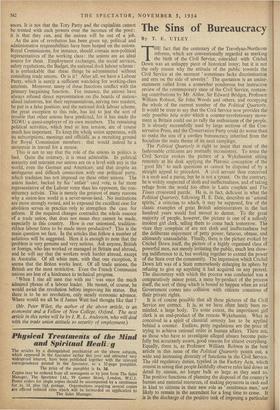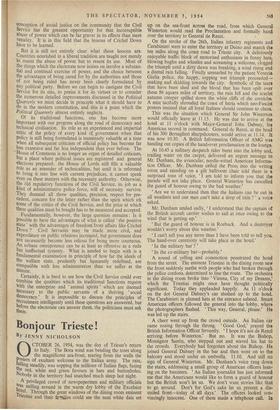The Sins of Bureaucracy
By T. E. UTLEY THE fact that the centenary of the Trevelyan-Northcote reforms, which are conventionally regarded as marking the birth of the Civil Service, coincided with Crichel Down was an unhappy piece of historical irony; but it is not the only reason why the attitude of the public towards the Civil Service at the moment 'sometimes lacks discrimination and errs on the side of severity.' The quotation is an under- statement culled from a somewhat ponderous but instructive review of the contemporary state of the Civil Service, contain- ing contributions by Mr. Attlee, Sir Edward Bridges, Professor William Robson, Sir John Woods and others, and occupying the whole of the current number of the Political Quarterly. It would be truer to say that the Civil Service now provides the only possible bête noire which a counter-revolutionary move- ment in Britain could use to rally the enthusiasm of the people. It is already successfully used by large sections of the Con- servative Press, and the Conservative Party could do worse than to make the sins of a swollen bureaucracy inherited from the Socialists the main theme of its next campaign.
The Political Quarterly is right to insist that most of the fashionable criticisms are mutually inconsistent. To some the Civil Service evokes the picture of a Wykehamist sitting remotely at his desk applying the Platonic conception of the 'good life' to such questions as cannot be disposed of by a straight appeal to precedent. A civil servant thus conceived is a snob and a purist, but he is not a tyrant. On the contrary, he is widely suspected of sloth and ineffectualness, and of taking refuge from the world too often in Latin couplets and The Times crossword puzzle. He is, in fact, deficient in what the Political Quarterly, following H. E. Dale, describes as 'animal spirits,' a criticism to which, it may be supposed, few of the classic examples of great British administrators in the last hundred years would feel moved to demur. To the great majority of people, however, the picture is one of a sullenly insolent girl clerk, telling them to come back tomorrow. The vices they complain of are not sloth and ineffectualness but the deliberate enjoyment of petty power, fatuous, obtuse, and ultimately unassailable. Finally, there is the picture evoked by Crichel Down itself, the picture of a highly organised class of powerful men, not merely irritating the public, much less show- ing indifference to it, but working together to extend the power of the State over the community. The impression which Crichel Down left was of a State remorselessly enlarging its sphere by refusing to give up anything it had acquired on any pretext. The discourtesy with which the process was conducted was a 'comparatively minor point, a mere by-product of the process itself, the sort of thing which is bound to happen when an avid Government comes into collision with citizens conscious of their private rights. It is of course possible that all these pictures of the Civil Service are correct. It is, as we have often lately been re- minded, a large body. To some extent, the impertinent girl clerk is an end-product of the remote Wykehamist. What is conceived in a spirit of classical serenity has to be applied behind a counter. Endless, petty regulations are the price of trying to achieve rational order in human affairs. There are, as those who have to investigate alleged abuses become pain- fully but accurately aware, good reasons for almost everything. Equally, there is, as Professor William Robson in the best article in this issue of the Political Quarterly points out, a wide and increasing diversity of functions in the Civil Service.
The old regulatory duties, typified in the Factory Acts, which consist in seeing that people faithfully observe rules laid down in detail by statute, no longer bulk so large as they used to. The positive functions of planning the disposal of the country's human and material resources, of making payments in cash and in kind to citizens in their new role as 'remittance men,' are likely to remain in the ascendant for a long time to come. It is in the discharge of the positive task of imposing a particular conception of social justice on the community that the Civil Service has the greatest opportunity for that incorruptible abuse of power which can be far graver in its effects than mere venality. It is in this field that the lessons of Crichel Down have to be learned.
But it is still not entirely clear what those lessons are. Countries nourished in a liberal tradition are taught not merely to resent the abuse of power but to resent its use. Most of the things which the electorate now insists on involve a substan- tial and continual exercise of power, and the choice between the advantages of being cared for by the authorities and those of not being ruled has never been clearly formulated by any political party. Before we can begin to castigate the Civil Service for its sins, to praise it for its virtues or to consider the numerous detailed improvements discussed in the Political Quarterly we must decide in principle what it should have to do in the modern constitution, and this is a point which the Political Quarterly almost entirely neglects.
Of• its traditional functions, one has become more important with our progress along the road of democracy and technical civilisation. Its role as an experienced and impartial critic of the policy of every kind of government when that Policy is still being formulated is immensely valuable at a time When all subsequent criticism of official policy has become far less extensive and far less independent than ever before. The 'House of Commons is no longer an organ of detailed criticism, but a place where political issues are registered and general elections prepared; the House of Lords still fills a valuable role as an amender of technicalities, but until it is reformed to bring it into line with current prejudices, it cannot speak even on these matters with the necessary authority. Otherwise. the Old regulatory functions of the Civil Service, its job as a kind of administrative police force, will of necessity survive. They demand all those qualities, precision, respect for pre- cedent, concern for the letter rather than the spirit which irk some of the critics of the Civil Service, and the price at which these qualities must be bought has to be measured and accepted.
Fundamentally, however, the large question remains : Is it Possible to have the advantages of what is called the positive State' with the advantages of freedom, from affairs like Crichel Down? Civil Servants may be made more civil, and expenditure on public relations increased, but government does not necessarily become less odious for being more courteous. An .urbane omnipotence can be at least as offensive as a rude but ineffectual tyranny. What is needed to begin with is a fundamental examination in principle of how far the ideals of the welfare state, prudently but humanely redefined, are compatible with less administration than we suffer at the minute.
Certainly, it is hard to see how the Civil Service could ever combine the qualities which its traditional functions require With the enterprise and animal spirits' which are deemed necessary to the public servants of a thriving social democracy.' It is impossible to discuss the principles of recruitment intelligently until these questions are answered, but before the electorate can answer them, the politicians must ask them.



































































 Previous page
Previous page